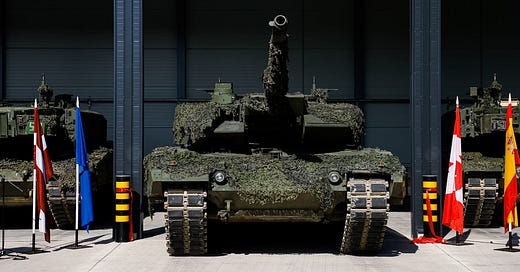Dear Readers,
This month, I had the opportunity to share insights from the Baltic experience for the US Helsinki Commission's briefing on Contesting Russia: Lessons from Central and Eastern Europe, alongside Andrew A. Michta and Dalibor Rohac. Watch the briefing or read my remarks. Now, a look at October in the Baltic countries.
Politics
Lithuanians went to the polls twice this month for parliamentary elections, serving Prime Minister Ingrida Šimonytė's incumbent Homeland Union party a “crushing defeat” and pushing Foreign Minister Gabrielius Landsbergis from leadership. Vilija Blinkevičiūtė, who led the Social Democrats to victory, said she would not take the PM role. For the Baltic Bulletin, Ignas Kalpokas breaks down the results and what it means for domestic and foreign policy.
Election day in the US is tomorrow. In the latest Baltic Ways episode, Daunis Auers, Andres Kasekamp, and Margarita Šešelgytė explain what the outcome could mean for the Baltic countries.
Domestic Affairs
The Baltic governments all foresee more than 3% of spending on defense in their proposed 2025 budgets, including significant aid to Ukraine. Minimum wages are also set to rise, though the standard in Latvia still falls far behind its Baltic neighbors at just €740 per month. While Estonia and Latvia struggle to rebound from recession, Lithuania is among the fastest-growing economies in Europe. Still, the Baltic hospitality sector is struggling — the industry staged protests across all three countries demanding a decrease in VAT taxes.
Lithuanian authorities are conducting a pre-trial investigation of property crimes and corruption involving Ieva Trinkūnaitė, head of fintech company Foxpay, and her partner Vilhelmas Germanas. The husband of Homeland Union MP Monika Navickienė — Mindaugas Navickas — is also under investigation, though Navickienė, the former minister for social security, has not been implicated. President Gitanas Nausėda called the incident the biggest political scandal in years.
According to data published by the Central Statistical Bureau, Latvia experienced the largest population decline in the European Union last year. Despite increased immigration, the population dropped by 11,000 people, or 0.6%, as birth rates fell.
Crime & Security
Weather balloons carrying smuggled cigarettes are crossing the Lithuanian border from Belarus. It could foreshadow something more sinister, warns Eitvydas Bajarūnas. Also, Lithuanian customs officers found military uniforms and camouflage nets on passenger trains traversing Lithuania from Kaliningrad to Moscow. The confiscated items will go to Ukraine. Latvia's state police made the largest drug bust in the country's history at a production facility housing more than a ton of illegal substances bound for elsewhere in Europe. And Estonian authorities helped take down a large-scale drug operation spanning Central through Northern Europe.
A new military center to support the NATO Multinational Brigade opened in Ādaži, Latvia, financed by Canada and Spain. In Ādaži and elsewhere in Latvia, NATO is conducting a two-week Digital Backbone Experiment, testing telecommunications, drones and low-earth orbit satellites, and how they might support multi-domain operations. Estonia completed its largest evacuation rescue exercise — a three-day drill that tested emergency services and government responses with more than 1,000 participants.
Monitoring agencies report significant increases in cyber crimes in the Baltic states since the full-scale invasion of Ukraine. Phishing in Estonia, for example, is up 87% in the first nine months of 2024, as compared with the same period last year, resulting in thousands of euros lost. Also, an investigative report suggests that Russian special units are organizing sabotage operations in the Baltic states and Poland from Kaliningrad.
Infrastructure & Climate
RailBaltica — the project connecting the Baltic countries to the European rail networks — remains beleaguered. At the end of October, the countries' transport ministries launched an effort to streamline management and operations. Also, Poland is warning that the slow modernization of Via Baltica — the roadway connecting Tallinn to Warsaw — is a security liability for NATO, but some officials say ports are more important.
The July storm that wreaked havoc in Latvia has led to €17 million in insurance claims paid out thus far, the highest amount for a single natural disaster. Some 20% of more than 9,500 claims were still pending as of the start of the month. Also, LRT looks back at some of the biggest storms to hit Lithuania.
Klaipeda's LNG terminal “Independence” celebrates 10 years of operations, helping reduce the region's reliance on Russian gas.
In Case You Missed It
Lithuania’s Parliamentary Elections: Domestic and Foreign Policy by Ignas Kalpokas
Contesting Russia: The Baltic Perspective by Indra Ekmanis
Inside Estonia’s Defense-Tech Ecosystem by Joel Burke
What a Harris or Trump Presidency Could Mean for the Baltic States - The Baltic Ways Podcast






